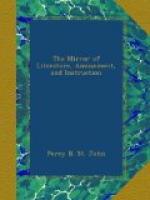The poet lived like a prince, but kept his accounts like a citizen; knowing to a sous where his money went: a good deal of it was bestowed charitably, for he was munificent, and certainly much loved in his neighbourhood. One night, when Tancrede was acting, and the court of the chateau was full of carriages and servants, there arrived, as ill luck would have it, a cask of the best chambertin that ever came from Burgundy; his own people could not attend to it, and the cask remained at his cellar door; the servants contrived to get at it, and while their masters and mistresses were shedding tears at the tragedy, they sipped the poet’s wine. There was generally a supper after the play, where more than once two hundred people sat down, and Voltaire had something to say to every one of his guests. As the gates of the town are shut at night, many of them usually remained in the chateau, poorly accommodated with beds. One night as M. de B——, was groping in the dark, for a place where he might lie down to sleep, he accidently put his finger into the mouth of M. de Florian, who bit it.
Voltaire kept company only with the aristocracy of Geneva; neither his liberality nor his wit secured him the good-will of the patriots placed out of the sphere of his influence; they only saw him a sham philosopher, without principles and solidity; a courtier, the slave of rank and fashion; the corrupter of their country, of which he made a jest. Quand je secoue ma perruque, he used to say, je poudre toute la republique!
Whatever might be Voltaire’s antipathy to the visits of strangers at his chateau, he seems to have met with an equal specimen of that temper from an Englishman. When in London, he waited upon Congreve, the poet, and passed him some compliments as to the reputation and merit of his works. Congreve thanked him; but at the same, time told Voltaire he did not choose to be considered as an author, but only as a private gentleman, and in that light expected to be visited. Voltaire answered, that if he had never been any thing but a private gentleman, in all probability he had never been troubled with that visit. He also observes, in his own account of this affair, he was not a little disgusted with so unseasonable a piece of vanity.
The memory of Voltaire and Rousseau is still cherished by the French people with great fondness; their busts or figures in bronze or plaster are frequently met with, and remind one of Penates, or household gods.
PHILO.
* * * * *
POPULAR SUPERSTITIONS.
WITCHCRAFT.
(For the Mirror.)




